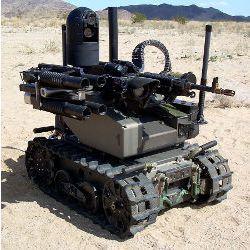The issue of autonomous weapons creates a heated debate. There is a push to get them banned (see our previous post ‘Why the Terminator Conundrum Requires Active Anti-proliferation Policies‘ and ‘How Urgent It Is to Ban Autonomous AI Driven Weapons‘). However, at least in the western world, the military appears to be quite reluctant to push for full autonomy, in particular when deciding to use lethal force. This debate is reflected in an excellent interview by The Verge ‘The future of war will be fought by machines, but will humans still be in charge?‘.
 The interesting part I find, and I read about it also in other places too, is that the military is reluctant to leave the robot take lethal engagement decisions on its own. Autonomy allows the weapon to use less manpower for moving around, analysing threats, reporting on the situation; but when it comes to engagement, the military want to have a stop button. In addition, it is probably also a good idea in case autonomous weapons would stop from identifying separately friend and foe!
The interesting part I find, and I read about it also in other places too, is that the military is reluctant to leave the robot take lethal engagement decisions on its own. Autonomy allows the weapon to use less manpower for moving around, analysing threats, reporting on the situation; but when it comes to engagement, the military want to have a stop button. In addition, it is probably also a good idea in case autonomous weapons would stop from identifying separately friend and foe!
One concern is that this approach may not be followed by Russia or China, or potentially terrorist organisations that would use some form of autonomous weapons. Some also mention that this willingness to keep humans in the loop may stem from the fear of losing one’s job. In any case, developments in this area are interesting to follow, in particular when there might be, somewhere in the world, some actual small scale engagement of weapons more autonomous than the current contraptions. This might take some time though as I guess that the military will not want its technology to fall in the hands of the opponent!
